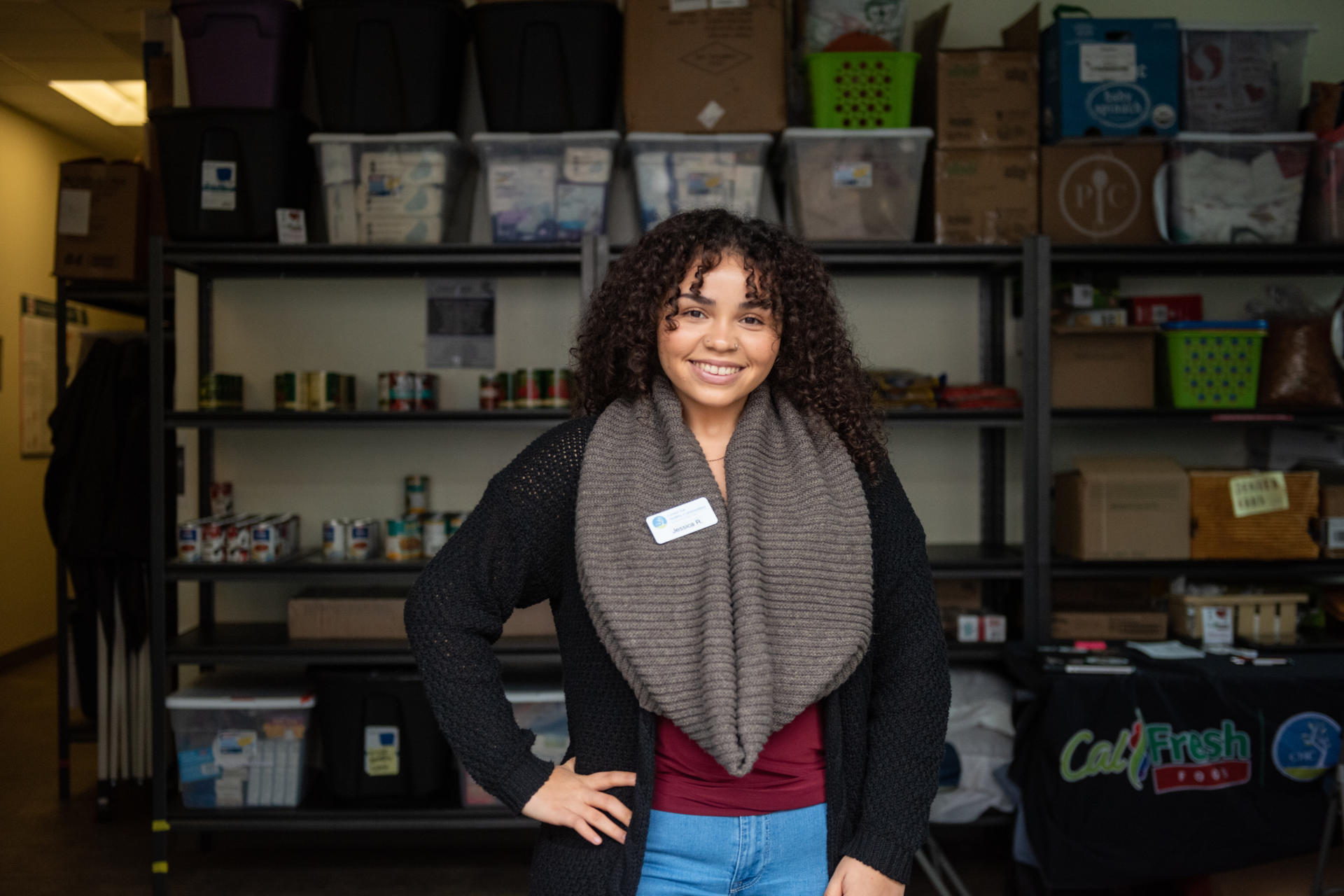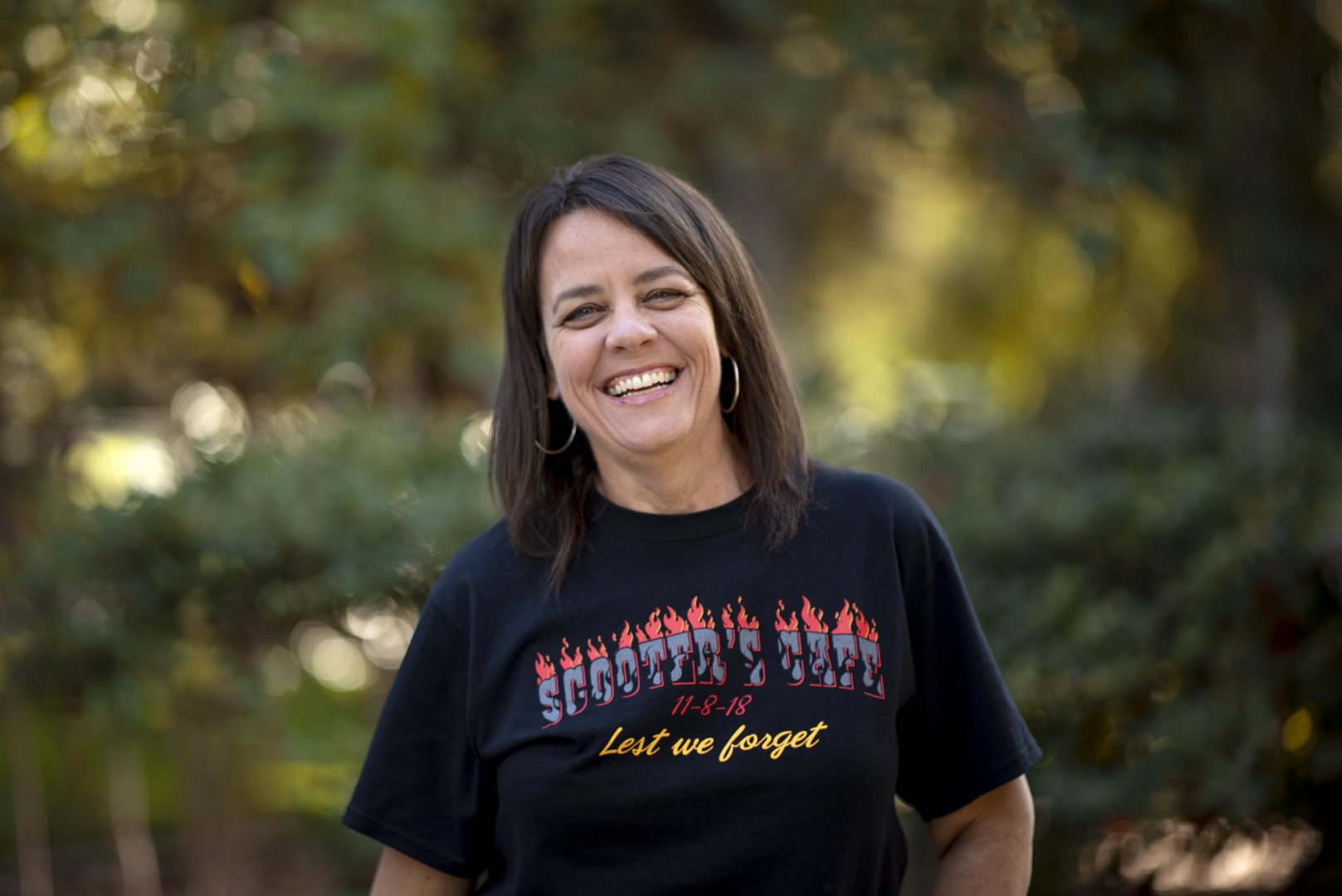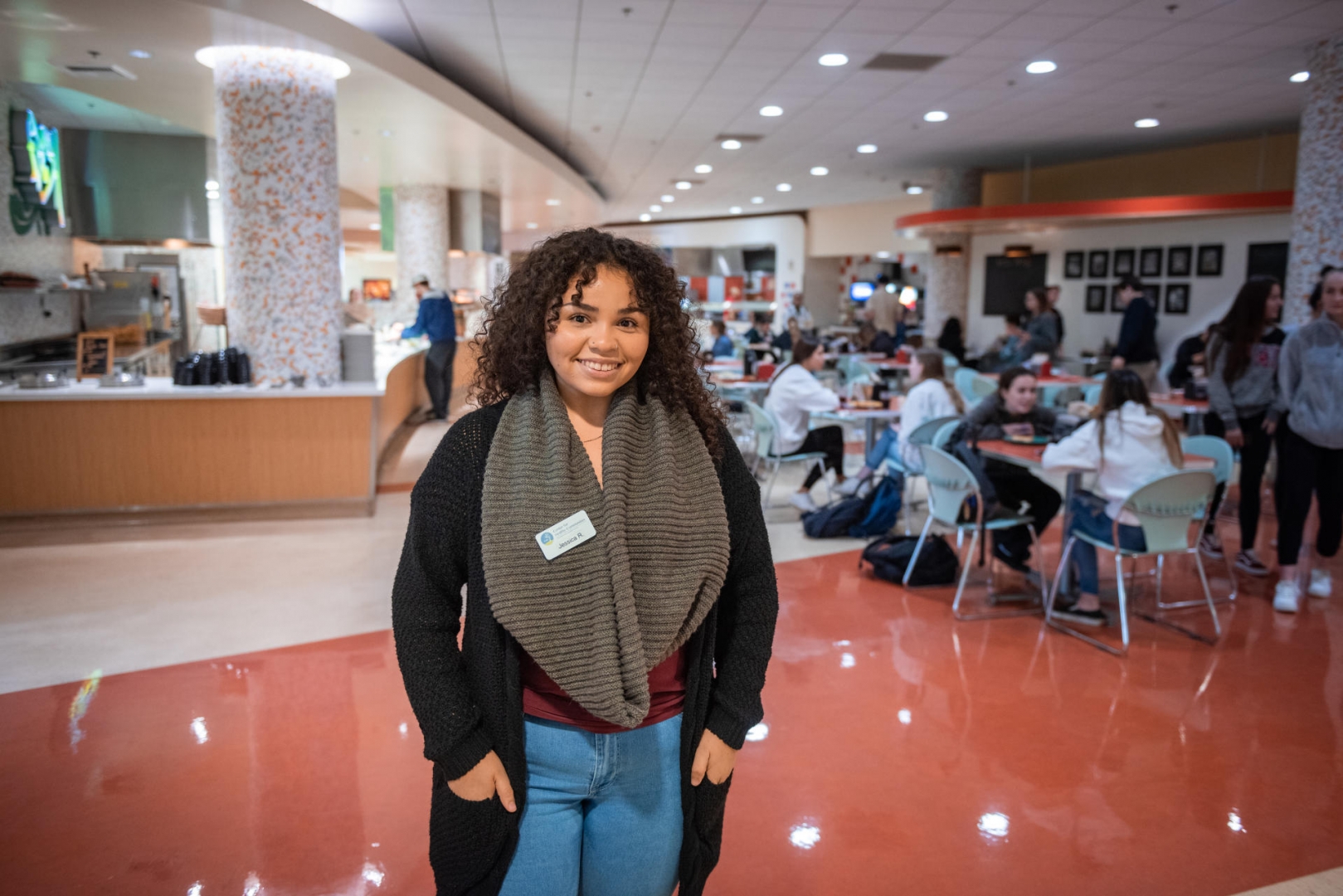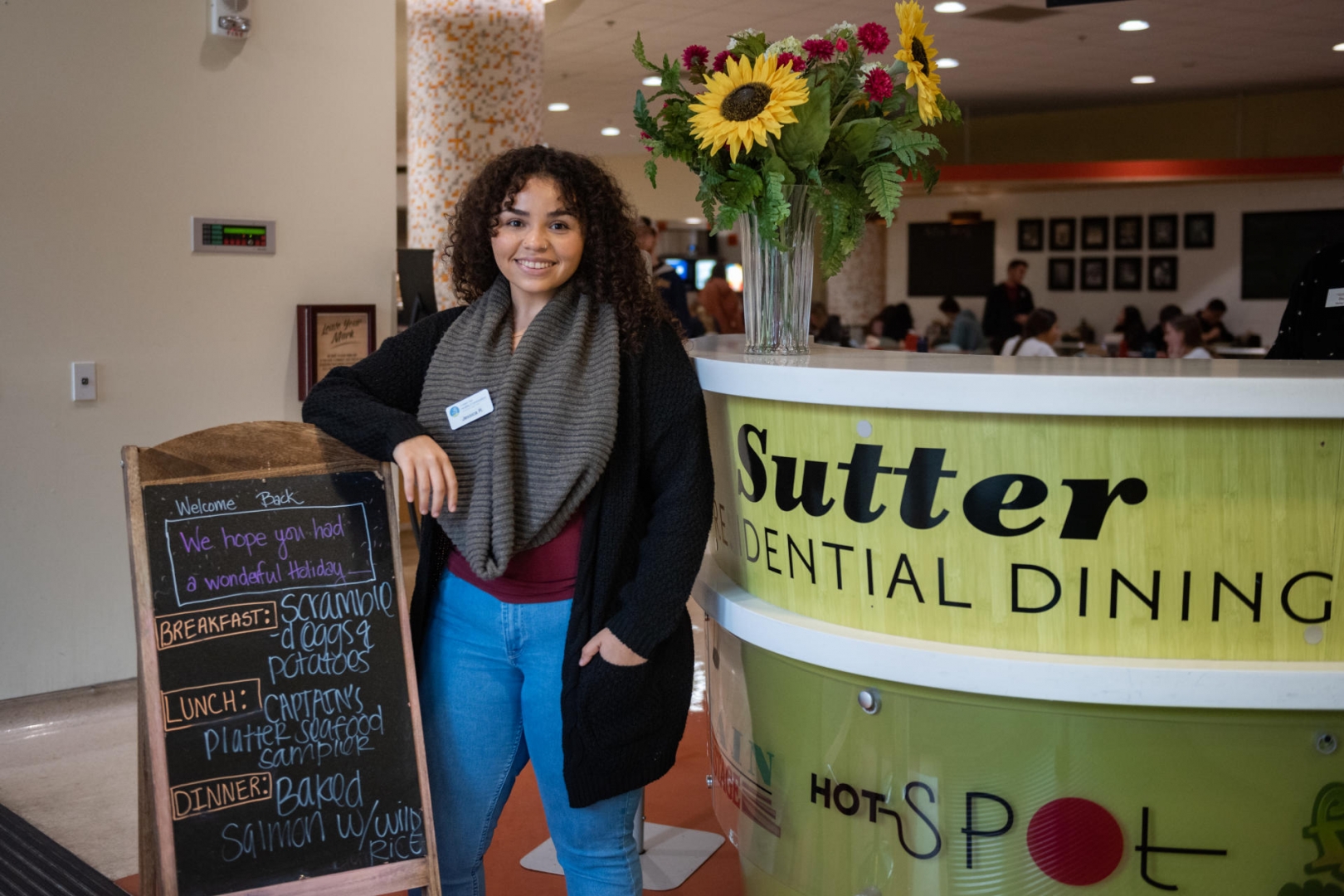Student Leads Swipe Against Hunger

Jessica Ramirez, who works at the Hungry Wildcat Food Pantry on Friday, December 13, 2019 in Chico, Calif., coordinated Swipes Against Hunger, a pilot program that allowed students to donate food swipes at Sutter Dining last month. (Jason Halley/University Photographer/CSU, Chico)
One day last spring, Jessica Ramirez strode purposefully into Marianne Paiva’s office—and she was angry.
The senior sociology major, enrolled in Paiva’s “Wealth and Inequality” class at the time, couldn’t shake a recent revelation. Living at University Housing, she’d purchased a semester meal plan through Associated Students (AS) Dining Services for the fall 2018 semester, and after cooking regularly in her University Village apartment, she had dozens of meals left on her account that would not roll over into the spring. Meanwhile, she knew that students on campus lived with food insecurity on a daily basis.
To Ramirez, a first-generation student whose academic focus is community health—specifically basic needs—this simply didn’t add up.
“I was shocked, taken aback, and really upset,” said Ramirez. “I thought, ‘How has no one else noticed this? Who is speaking up for these students?’”
Now in her fourth year of college, Ramirez understands firsthand the financial challenges of paying for food, housing, tuition, and other necessities. And she had a sense she was not alone.
“I realized that many of my classmates were starving or surviving off of energy drinks,” she said. “They were not getting the food they need to live, survive, and perform optimally in the classroom.”
Ramirez and Paiva, faculty in the Departments of Sociology and Multicultural and Gender Studies, dug deeper, brainstorming reasons why meals remain on some students’ meal accounts, yet other students go hungry.

Jessica Bartlett / University Photographer
“I love it when people are angry about something,” said Paiva, whose own research background includes food insecurity. “Because that means they’re probably going to do something about it.”
Paiva (Sociology, ’99; MA, Social Science, ’01) and Ramirez researched ways to bridge the gap between leftover meals and hungry students. Paiva guided Ramirez in creating surveys, which the senior distributed when she spoke to classes about this topic. She wanted answers: Were students using all of their meals? Was it just an issue that she faced? And how many Chico State students lived with food insecurity?
The survey results confirmed her suspicions. Fellow Wildcats with meal plans often had dozens of leftover meals that went uneaten; students employed at Sutter Dining reported that large amounts of food gets tossed out every day; and a 2016 study by the Center for Healthy Communities revealed that 46 percent of Chico State students have experienced food insecurity.
Ramirez had her data and was determined to fight for change.
The result was a first-of-its-kind campus partnership between AS Dining, the Center for Healthy Communities, and the Hungry Wildcat Food Pantry called Swipe Against Hunger. On November 14, Sutter Dining hosted a one-day event in which Chico State students could donate a meal—simply by swiping their meal card.
For this pilot project, students were limited to donating a single meal. The result was an astounding 419 swipes—sent to a virtual bank hosted by the Hungry Wildcat Food Pantry, which will judiciously disperse them to students throughout the spring semester. Ramirez thinks of basic needs as a foundation for life, so seeing hundreds of individual students donate meals instilled hope from her fellow Wildcats.
“You can’t focus on academics, you can’t focus on extracurriculars and be part of clubs and all these things that we encourage our students to do when you’re struggling to find safety and shelter and food,” she said. “Seeing students come in and be so willing to donate, I was blown away. I just wanted to hug every single one of them.”
Originally from Oxnard, Ramirez’s interest in basic needs stems from her own experience living an impoverished life and struggling to meet her basic needs for most of her life.

“My mother is a recovering drug addict and relapses every so often,” she said. “My dad passed away due to a drug deal gone bad when I was 12.”
Ramirez mostly was raised by her grandmother. However, food and housing were never guaranteed—and her grades in high school reflected the uncertainty and chaos. By the end of her sophomore year, her academics were so poor that she was transferred to a continuation school, where she came to a realization.
“I didn’t want to end up in the same pattern that much of my family had been in, being very impoverished,” she said. “That was not where I wanted to be in my life.”
Ramirez set college in her sights and found supportive staff and faculty at her school to help.
“They showed me that I have potential past all the times I was told I was stupid and I wasn’t going to amount anything, that I was going to end up just like my parents,” she said.
Once focused, Ramirez took enough classes during the day to graduate from high school early, and college-level classes at night. She discovered her interest in sociology because she said it provided actual terms by which to frame her life experiences and hopefully shape those of others.
Ramirez’s resilience paid off. After years of loss, uncertainty, and struggle, she began a new chapter—attending Chico State.
“I just took my pain and my suffering and really turned that into a strength,” she said. “I realized this isn’t something I should be embarrassed about.”

Ramirez has used the Hungry Wildcat Food Pantry on numerous occasions. And even at Chico State, she has experienced homelessness. In the few weeks after the spring 2019 semester and the beginning of a summer internship in South Lake Tahoe, Ramirez slept in her car for a few nights before Paiva, learning of her situation, sheltered Ramirez in her own home until her internship began.
In the fall, Ramirez became even more committed to her work. She started an internship at the Center for Healthy Communities, where she was supervised by outreach coordinator Emily Foxworthy. Right away, Foxworthy (Nutrition and Food Science, ’05) saw her intern’s determination, passion, and innate drive to help fellow students meet their basic needs.
“She just has such unique qualities that you don’t find in many students,” Foxworthy said. “It’s been such a joy to sit back and just really watch her shine. … We’ve tried for a lot of years to work on (the meal swipe) project and were not successful. So to have a student just bust through and make it happen was amazing.”
On the day of Swipe Against Hunger, Ramirez didn’t know what to expect.
“I just hung out in the dining hall and thanked students as they came in and donated,” she said. “I was just blown away, because I saw students come in not to eat, but just to donate a swipe.”
Ramirez is now a paid student employee for the CHC—as part of the Cal Fresh Outreach team inside the Hungry Wildcat Food Pantry. Following graduation in spring 2020, she plans to go into the Peace Corps, open to go wherever she’s needed.
“I’d like to go into the realm of community health, starting community programs surrounding the issue of basic needs in other countries,” she said, “and really just go from there and see where my career takes me after that.”
Until then, though, plans for a spring 2020 Swipe Against Hunger are already underway. Paiva said Ramirez’s most notable strengths are her sincerity and authenticity when talking about food insecurity.
“She can say, ‘I’ve experienced sleeping in my car, I have experienced not having enough food to eat. I’ve experienced having poor quality food to eat, inadequate food to eat,” Paiva said. “She understands what it means to have to rely on food that is high-sugar, high-fat, high-salt, which all affect your health because those are the cheapest, most easily accessible things. She has lived it and so she can speak with authority on the matter and other students will follow.”


